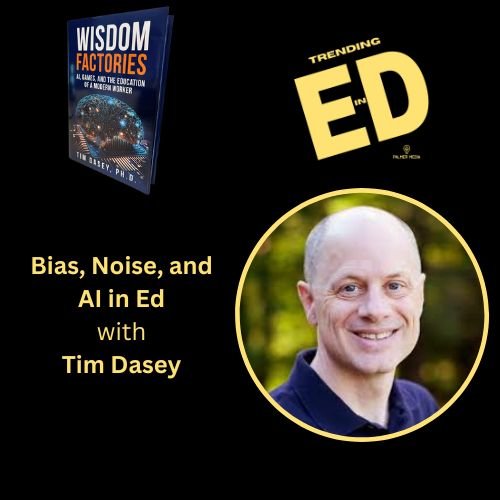
WISDOM FACTORIES
AI, Games, and the Education of a Modern Worker
Wisdom Factories Publicity
Wisdom Factories asks “What if the fundamentals of schooling don’t fit the AI era?”
AI will be the work experts, so humanity must supply wisdom. This requires upending a century of educational dogma.
Dr. Dasey reckons with an unavoidable conflict—schools currently spend most of their energy teaching students to do what AI does best. The solution for schools and work is to focus on wisdom skills like critical thinking, creativity, relating, and teaming. These complement AI, not compete with it.
Learning wisdom can only be done well with a new educational model that’s nearly upside down from the current one—a model that changes the curriculum, teaching, and even the structure of schooling.
AI evolves very rapidly, but we humans don’t. If we aren’t wise, then AI will consume those roles too. Can we create Wisdom Factories before it’s too late?
Experience, play, meta-knowledge, and multidisciplinary curricula are the new fundamentals.
In Wisdom Factories, readers will learn:
Technical know-how isn’t a panacea;
Wisdom and games are inseparable companions;
Toxic workplaces are associated with expertise, not wisdom;
Experience deprivation may be the biggest challenge for disadvantaged students;
Managing AI teams should involve a form of therapy;
The best way to hire workers is to have them play.
Quotes from Wisdom Factories
-
“If we cannot step up and provide the wisdom that complements AI, then technology might consume those roles too. If human judgment is a coin flip, then machines could do the flipping. Too many of us will end up on the discard pile competing for low-wage work.”
-
“Intuition isn’t necessarily correct…However, it’s not an inherently bad and unreliable creature that we’re supposed to overcome with logic and concentration.”
-
“Games are not just ways to improve learner engagement. They also teach concepts that can’t be taught well through other mechanisms.”
-
“The first principle of wisdom learning is to prioritize student agency. The second is to organize teaching around complex, multi-disciplinary challenges. The third principle may be the hardest for the education system to swallow…How one divides up wisdom competencies is going to be very different from how expertise learning is divided up. The curriculum will have to change.”
-
“Managing an AI team is then part having an empathy of a sort toward the tech—anthropomorphic or not—part understanding the decision context and the characteristics of the person using the AI, and part product savvy.”




